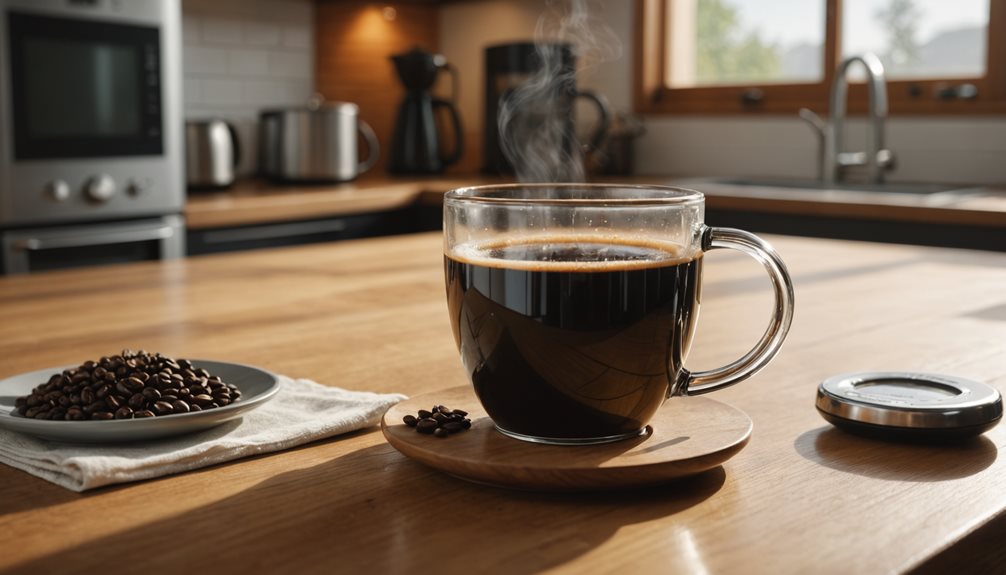If you’ve started intermittent fasting, you’re probably wondering if coffee fits into your routine. Good news: you don’t have to give up your morning brew. But what you add to your cup matters, and there are a few important things to consider if you want to keep your fast on track. Before you reach for the sugar or cream, let’s explore what coffee really does to your fast and how to make the most of it.
Key Takeaways
- You can drink plain black coffee while intermittent fasting without breaking your fast.
- Black coffee has minimal calories and does not trigger a significant insulin response during fasting periods.
- Adding milk, cream, sugar, or high-calorie additives to coffee will break your fast.
- Non-nutritive sweeteners like stevia are generally acceptable but may affect some individuals’ metabolic response.
- Coffee may help suppress appetite and support mental alertness during fasting windows.
The Relationship Between Coffee and Intermittent Fasting

Intermittent fasting involves restricting calorie intake during specific time periods.
During the fasting window, consuming black coffee is generally considered acceptable because it contains very few calories—typically less than five per cup—and is unlikely to disrupt the fasting state.
Coffee may also help manage appetite and support mental alertness, which could make adherence to fasting periods more manageable for some individuals.
Additionally, caffeine can have a modest effect on metabolism, which may complement weight management efforts.
It’s important to consume coffee without added sugars, cream, or other high-calorie ingredients, as these additions could break a fast.
What You Can Add to Your Coffee Without Breaking a Fast
When intermittent fasting, it’s important to understand which coffee additives are unlikely to disrupt the fasting process. Plain black coffee is generally considered the most appropriate option, as it contains very few calories and doesn’t trigger metabolic responses that would break a fast.
Small amounts of spices such as cinnamon or nutmeg can be added for flavor, as they contribute a negligible amount of calories. Non-nutritive sweeteners—including stevia and monk fruit—are also commonly used because they don’t contain significant calories or carbohydrates.
However, individual responses to sweeteners may vary, and some research suggests that even non-caloric sweeteners could influence insulin response in some people.
Additions like MCT oil or heavy cream provide additional calories and fat. While some individuals following certain intermittent fasting protocols, such as “fat fasting,” may include these, consuming them can interrupt the physiological benefits of a true fast, such as autophagy and reduced insulin levels.
Unsweetened almond milk generally contains a low number of calories per serving, but even small amounts may introduce enough energy to diminish some fasting-related health benefits. For those seeking to maximize the effects of intermittent fasting, it’s advisable to avoid any ingredients that contain calories.
Health Benefits of Drinking Coffee While Fasting
Research indicates that consuming black coffee during the fasting window is compatible with most intermittent fasting protocols. Black coffee contains minimal calories and generally doesn’t disrupt the metabolic state associated with fasting.
Studies have shown that caffeine may modestly increase metabolic rate and promote fat oxidation, which can contribute to weight management. Additionally, caffeine is known to have appetite-suppressing effects, which may help some individuals adhere to their fasting schedule.
Coffee is also a source of antioxidants, which play a role in reducing inflammation and may contribute to cardiovascular health. Furthermore, regular coffee intake has been associated with a reduced risk of certain neurodegenerative conditions, including Alzheimer’s and Parkinson’s disease.
Caffeine Intake: How Much Is Too Much During Fasting?

Caffeine is a key component in coffee and can influence the effects of intermittent fasting. Current guidelines indicate that up to 400 mg of caffeine per day is generally considered safe for most healthy adults.
Consuming caffeine within this limit may support metabolic processes and increase fat oxidation during fasting. However, individual tolerance to caffeine can vary, and excessive intake may lead to side effects such as anxiety, sleep disturbances, or gastrointestinal discomfort.
It’s advisable to monitor your response to caffeine, particularly while fasting, and adjust your intake accordingly to minimize potential negative effects.
Understanding What Breaks a Fast
It’s important to understand what constitutes breaking a fast, particularly during intermittent fasting. Consuming any beverage or food that contains calories—such as milk, cream, sugar, or flavored syrups—will interrupt the fasting state, as these ingredients initiate digestive activity and can prompt an insulin response.
This can potentially diminish some of the intended benefits of fasting, such as weight management and metabolic improvements. Black coffee is generally considered acceptable during fasting periods because it contains minimal calories and doesn’t significantly affect insulin levels.
Artificial sweeteners may also stimulate metabolic responses in some individuals, though research on their exact effects remains mixed. For those seeking to maintain the physiological state associated with intermittent fasting, it’s advisable to limit consumption to water or plain black coffee.
Tips for Maximizing Your Fasting and Coffee Routine
Understanding which beverages can break a fast is essential for maintaining the intended benefits of fasting routines. Black coffee is a common choice for individuals practicing intermittent fasting because it’s very low in calories and generally doesn’t disrupt the fasting state.
It’s recommended to limit coffee intake to 1-2 cups per day, as excessive caffeine consumption may lead to increased anxiety or negatively affect sleep quality.
For those seeking additional flavor without increasing caloric intake, adding small amounts of calorie-free spices such as cinnamon or nutmeg is an option. Hydration is important during fasting periods, so it’s advisable to drink water in addition to coffee.
Caffeine, present in coffee, has appetite-suppressing properties, and its effects may vary between individuals. Therefore, monitoring personal responses to coffee during fasting can help determine the most suitable routine for each individual.